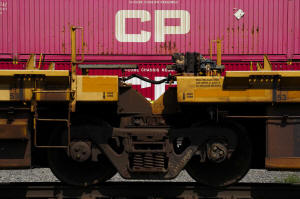CSX railroad's merger prospects derail as BNSF and CPKC make clear they
aren't interested in a deal
[August 27, 2025] By
JOSH FUNK
OMAHA, Neb. (AP) — The prospects for additional consolidation in the
rail industry derailed this week when both of CSX's potential partners
said they weren't interested in a deal.
Investors widely speculated that CSX would be an acquisition target once
rumors of merger talks between Union Pacific and Norfolk Southern
emerged over the summer, because of the challenge of competing against a
nationwide railroad.
CSX's stock nearly hit a new 52-week high last week at $37.25 before
falling to $32.31 Tuesday after it became clear that neither BNSF nor
CPKC railroads is pursuing the Jacksonville, Florida-based railroad, one
of the six remaining major freight railroads in North America.
The Union Pacific-Norfolk Southern deal still faces a lengthy review by
the U.S. Surface Transportation Board that is likely to stretch on for
at least two years. When Canadian Pacific acquired Kansas City Southern
two years ago in the first major rail merger in more than two decades
the board also spent two years reviewing that deal.
If the $85 billion megamerger of Union Pacific and Norfolk Southern does
get approved that might change the calculus about whether a deal makes
sense. But in the meantime, CSX and the other major freight railroads
seem focused on finding ways to cooperate more to improve service
without merging.

Just last week, CSX and BNSF announced an agreement to deliver some
shipments seamlessly coast-to-coast without handing them off. Last
month, CPKC and CSX announced a similar agreement to streamline
shipments between Mexico, Texas and the Southeast.
CPKC CEO Keith Creel said he thinks the industry should be more focused
on agreements like that and efforts to improve service on each
individual railroad.
“We believe that a transcontinental merger would trigger permanent
restructuring of the industry and result in a disproportionately large
railway whose size and scope would require others to take action,” Creel
said. “This will likely result in an unnecessary wave of railway mergers
that today is not the best way to support American businesses nor the
public interest, and has the potential to create more issues than it
solves.”
[to top of second column] |

Trains sit idle at a Canadian Pacific Kansas City (CPKC) rail yard
in Smiths Falls, Ontario, Canada, Aug. 22, 2024. (Sean
Kilpatrick/The Canadian Press via AP, File)
 Indeed, the STB adopted a high
standard for rail mergers in 2001 after a series of prolonged
disruptions and delayed shipments that followed major deals in the
1990s. A merger between Union Pacific and Southern Pacific in 1996
led to an extended period of snarled traffic on U.S. rails. Three
years later, Conrail was divvied up by Norfolk Southern and CSX,
creating serious backups in the East.
On Monday, Warren Buffett, whose Berkshire Hathaway conglomerate
owns BNSF, said to CNBC that he's not interested in buying another
railroad even though he's sitting on more than $344 billion in cash
after several years without completing a major acquisition. Buffett
and the man who will take over as Berkshire CEO in January, Greg
Abel, did recently meet with CSX CEO Joe Hinrichs to discuss more
ways to cooperate while making it clear that Berkshire won't be
bidding on CSX.
So CSX is going to have a hard time satisfying the demands of the
Ancora Holdings fund and other investors who are putting pressure on
the railroad to make a deal. Ancora sent a letter to the CSX board
earlier this month urging them to act quickly to make a deal with
another railroad or fire Hinrichs as CEO and reform the railroad to
improve results.
CSX said in a statement that the railroad's board remains “laser
focused on exploring any and all opportunities to enhance
shareholder value, drive profitable growth and provide industry
leading customer service.” That echoes what Hinrichs said when CSX
reported earnings earlier in July.
All contents © copyright 2025 Associated Press. All rights reserved
 |